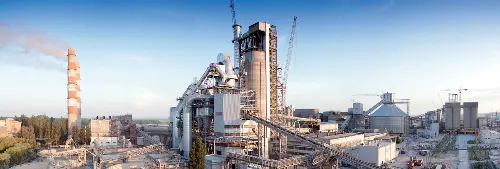
Interview with Elena Guede: 100 years of innovation and sustainability
"Respect for the environment and local community" - these are the vital points of Cementos Portland De Lemona to its plant manager, Elena Guede. The company has lately celebrated its 100th anniversary in grand style.
Their beginnings, their hard times, their recovery: "There is no secret to success, just real determination to do well". Sustainability, innavation and international vision - these are the cornerstones of the Spanish company based in Vizcaya.
Cementos Portland De Lemona was first established in 1917 and celebrated its 100th anniversary in grand style this year. Let’s find out more about this company by speaking to its Plant Manager, Elena Guede.
Congratulations on your anniversary! What is your secret?
To reach this landmark we have really had to work hard on adapting to our surroundings, constantly reinventing ourselves while holding onto our own personality and identity. There is no secret to success, just real determination to do well while envisaging economic and legal changes that might have some negative influence and getting ready to take on new challenges.
Are there any particular moments in the company’s history that have been turning points marking the transition from the past to the future of your business operations?
Over the last few months we have retraced our history attempting to sum up its most important moments… They undoubtedly include the takeover in 1989, the appointment of a new Board of Directors at the same time to make sure the company continued on a family-run basis and then the first experiments with alternative fuel in the kiln. We were the first in the whole of Spain to use shredded tyres and meat and bone meal (MBM).
Developing innovative projects has also resulted in our travelling around Europe and opening up our minds, improving our business’s impact on the environment, drastically reducing emissions of gas and various types of particles into the air and reducing noise levels. Last but not least, CRH’s (an international manufacturer of cement, aggregates, concrete products and asphalt) takeover was a gambol that really paid off for us and helped to reach our 100th anniversary.
What effect did the extremely bad recession of 2008-2009, which had such a major impact on the building industry in Spain, have on you?
The recession hit us really hard. At the time we were part of the Cementos Portland Valderrivas Group, whose operations were mainly focused in Spain. The market slowly began to shrink and that resulted in a drop in both production and investment until ultimately all operations were halted at the plant. It was a very tricky period of upheaval during which we lost a lot of customers.
Did you manage to turn the situation around?
The turning point was when we were taken over by CRH, which allowed us to keep the manufacturing plant running all year long and benefit from a stable national and international market.
You have been the plant manager for the last four years, although you have actually worked there since 1995. What goals did you set yourself when you became plant manager?
My appointment as plant manager came at one of the worst moments for the company: the plant had been closed for nine months with a reduced manufacturing output, a strike was under way and lots of workers had lost their jobs. It was hard to set any medium/long-term goals, the priority was to solve the problems we had at that time and make sure the company stayed in business. The targets we set were to make the manufacturing processes as efficient as possible, reduce the amount of time the kiln was not in operation and reach thermal/electrical consumption levels on a par with the rest of the Group’s European factories, without overlooking the idea of using alternative fuels and secondary raw materials. We can now claim to have reached these goals: the Lemona plant meets even the most stringent standards.
How can you make sure your business remains sustainable in the long term?
The sustainability of a business model depends primarily on the stability of the national market, to the detriment of exports. Our plant is already organised to achieve maximum output and we also plan to make a few changes to the plant, such as revamping the clinker roller press to improve efficiency and grinding costs.
You became the first woman in Spain to head a cement plant. Are you proud of this achievement?
I am not particularly proud of being the first woman to head a cement plant in Spain or in our group, but I am very proud of being at the helm of a team of dedicated and responsible people, who have allowed me to achieve the targets I have already mentioned. It is no secret that this is a predominantly male-dominated business, but for that very reason being in this position allows you to keep on learning and doing better.
What do you think the building industry needs to do to attract more female talent?
Changes of this scope take time and require progress to be made in the industry. There are increasingly fewer obstacles to change: companies have their own equality programmes and women are increasingly choosing careers in engineering or technology. These are also cultural changes, so they vary from country to country, but I believe that if women are willing to take a chance on this kind of technical career, then there is nothing to stop them from achieving these professional goals.
What influence do sustainability and business innovation have?
Sustainability is in the company’s DNA. Since our plant is located in the middle of a small town like Lemona, respect for the environment and local community are vital for our survival. Our economic progress has always progressed hand-in-hand with investment in the environment, such as changes in manufacturing models and gas purification processes to keep within the most stringent limits on emissions and noise levels. We have had ISO 14001 certification since 2000. We were also one of the first companies in the industry to adopt the EMAS Management System and we have been drawing up our own Sustainability Report since 2003. This has resulted in our winning numerous national and international awards. Sustainability has progressed hand-in-hand with innovation: we were pioneers in developing waste management projects, controlling emissions into the air, developing new cement and concrete-based products, and reducing CO2 emissions to a minimum, being actively involved in both national and European innovation programmes over the last 20 years.
How can the cement industry make sure that certain types of waste do not end up in dumps?
The cement manufacturing industry has a vital part to play in the worldwide management of waste. When waste cannot be reused or recycled, it must be used for a secondary purpose in cement plants.
As an example, when certain plastics can no longer be reused, such as the film used for bags for holding rubbish/garbage or others of low-quality, they can be suitably adapted to be used as fuel in the clinker kiln instead of other fossil fuels such as petcoke. This means they do not need to be disposed in landfills, where they would remain for a hundred of years without degrading.
Waste that can still be recycled or reused should not be sent to cement plants, just waste for which all other options have been considered and which the plant could make use of as a material or for energy purposes. This is the case, for instance, with tyres, meat and bone meal, foundry sand and slag from steel works etc.
How would you describe your experience working with Mapei products?
We were one of the first cement plants to carry on industrial tests and use Mapei cement additives in Spain and so far they have certainly met the standards we expect and the needs of our production process.
For any further information , please consult our dedicated online section on C-ADD Mapei Division







